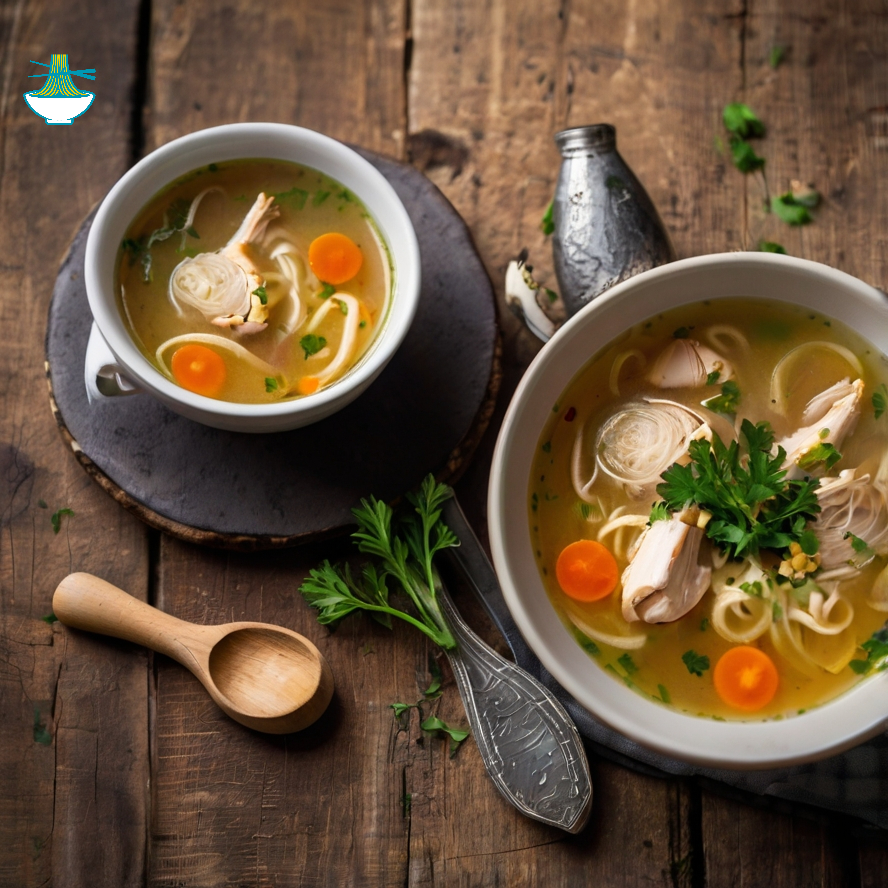uncover Rosoł or Polish soup, a classic Polish chicken soup with rich, flavorful broth,tender chicken,and hearty noodles.Perfect for chilly evenings or anytime.
Here's a simple recipe for Rosoł, a traditional Polish chicken soup often served with noodles:
Ingredients:
- 1 whole chicken (about 3-4 pounds), skin removed
- 2 carrots, peeled and chopped
- 2 celery stalks, chopped
- 1 onion, peeled and quartered
- 1 leek, washed and chopped
- 1 parsnip, peeled and chopped
- 1 small bunch of fresh parsley
- 1 bay leaf
- 6-8 cups water
- Salt and pepper to taste
- Cooked noodles, for serving
- Fresh parsley, chopped, for garnish
Instructions:
1- Place the chicken in a large pot and cover with water. Bring to a boil over medium-high heat, then reduce the heat to low and simmer for about 1 hour, skimming off any foam that rises to the surface.
2- Add the carrots, celery, onion, leek, parsnip, parsley, and bay leaf to the pot. Continue to simmer for another 1-2 hours, or until the chicken is very tender and the broth is flavorful.
3- Remove the chicken from the pot and let it cool slightly. Remove the meat from the bones and shred or chop it into bite-sized pieces. Discard the bones and return the meat to the pot.
4- Season the soup with salt and pepper to taste. Serve hot over cooked noodles, garnished with chopped parsley. Enjoy your delicious Rosoł!
Nutritional Values:
Here are the approximate nutritional values for the ingredients in the Rosoł recipe:
Chicken:
1 whole chicken (about 3-4 pounds) provides roughly:
- Calories: 1200-1600
- Protein: 150-200g
- Fat: 60-80g
- Carbohydrates: 0g
benefits:
- Rich in protein, essential for muscle growth and repair.
- Contains vitamins and minerals like B vitamins, which are important for energy metabolism, and selenium, which acts as an antioxidant.
Carrots (2 medium carrots, chopped):
- Calories: 50
- Protein: 1g
- Fat: 0g
- Carbohydrates: 12g
- Fiber: 3g
benefits:
- High in beta-carotene, which is converted into vitamin A in the body and important for vision, immune function, and skin health.
- Good source of fiber, which aids in digestion and helps maintain a healthy weight.
Celery (2 stalks, chopped):
- Calories: 20
- Protein: 1g
- Fat: 0g
- Carbohydrates: 5g
- Fiber: 2g
benefits:
- Low in calories but high in fiber, making it a great option for weight management.
- Contains antioxidants and anti-inflammatory compounds that may help reduce inflammation and lower the risk of chronic diseases.
Onion (1 medium onion, quartered):
- Calories: 45
- Protein: 1g
- Fat: 0g
- Carbohydrates: 11g
- Fiber: 2g
benefits:
- Contains antioxidants that help combat oxidative stress and reduce the risk of chronic diseases.
- Rich in prebiotic fibers that feed beneficial gut bacteria, which is important for digestive health and immune function.
Leek (1 medium leek, chopped):
- Calories: 50
- Protein: 1g
- Fat: 0g
- Carbohydrates: 12g
- Fiber: 1g
benefits:
- Contains vitamins A, C, and K, as well as manganese and fiber, which are beneficial for overall health.
- May have antimicrobial properties and help support healthy gut bacteria.
Parsnip (1 parsnip, chopped):
- Calories: 100
- Protein: 1g
- Fat: 0g
- Carbohydrates: 24g
- Fiber: 6g
benefits:
- Good source of fiber, which aids in digestion and helps maintain a healthy gut.
- Contains vitamin C, which is important for immune function and skin health.
Parsley (1 small bunch):
- Calories: 10
- Protein: 1g
- Fat: 0g
- Carbohydrates: 2g
- Fiber: 1g
benefits:
- Rich in vitamins K, C, and A, as well as antioxidants, which help reduce inflammation and oxidative stress in the body.
- May have antibacterial properties and help support kidney health.
Bay Leaf (1 leaf):
- Calories: 5
- Protein: 0g
- Fat: 0g
- Carbohydrates: 1g
- Fiber: 0g
benefits:
- Contains antioxidants and compounds that may have anti-inflammatory effects.
- May help regulate blood sugar levels and improve insulin sensitivity.
Noodles (amount varies, depending on serving):
- Calories: Varies (typically 200-400 calories per cup)
- Protein: Varies (typically 5-10g per cup)
- Fat: Varies (typically 1-5g per cup)
- Carbohydrates: Varies (typically 40-50g per cup)
benefits:
- Provides energy from carbohydrates, which is important for overall functioning and physical activity.
- Can be a source of fiber and protein, depending on the type of noodles used.
Please note that these values are approximate and can vary based on the specific brands and quantities of ingredients used.


Comments